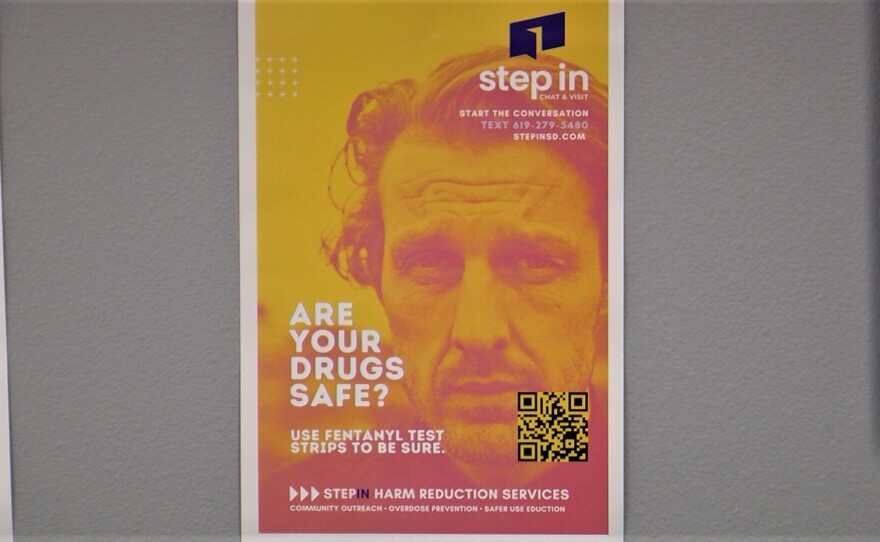This weekend, the first full-scale San Diego Pride parade and festival in more than two years will be held.
Organizers report a 20% increase over 2019 in ticket sales for the weekend Pride Festival in Balboa Park with an expected attendance of almost 55,000 people. The parade through Hillcrest and Banker’s Hill on Saturday could attract up to 300,000 participants and spectators.
With the celebrations, there is concern about illegal drug use that could lead to overdoses and a growing number of deaths in the LGBTQ community.
Ed Urgiles is the lead coordinator of the new StepIn program designed to meet active drug users where they are in their addiction. The approach is called harm reduction.

“We keep our personal opinions away from the work,” Urgiles said, “And just help people stay alive regardless of what state of mind or situation they’re in.”
The StepIn program is an extension of Stepping Stone, the residential and outpatient recovery organization founded in 1976 in response to the unique challenges LGBTQ people face with addiction.
“There’s a lot of stigmas that already go with addiction,” said Pam Highfill, the Stepping Stone outpatient director who is also supervising the new harm reduction program. “The fact that we’re working with the LGBTQ population, there’s even more stigma on top of that,” she continued.
StepIn is a grant-funded effort to do community outreach to active drug users and provide overdose prevention options and education.
“Right now, it’s fentanyl that has just skyrocketed overdose deaths in the gay community,” Urgiles said. Fentanyl is a lab-manufactured opioid that is 50 to 100 times more potent than morphine or heroin.

There is a current health crisis because law enforcement officials report that almost every street drug including cocaine and methamphetamine is now laced with the powerful substance.
It cannot be seen, smelled, or tasted until it’s too late.
“There are a lot of gay men who get addicted to methamphetamine that is mixed with fentanyl," said Highfill. "I don’t think our community has a very broad awareness of the harm that this particular substance has done to us.”
Steven's story

Steven Baisa was born and raised in San Diego. He also used drugs for years. Even though he is a straight man, Baisa attended 12-step meetings at the predominantly LGBTQ Live and Let Live Alano Club in Hillcrest.
"If it wasn't for the Alano Club, I'd probably be dead," he said.
He often took some of the free Narcan offered through the club to give to friends still in active addiction. Then in late January, he relapsed with a friend who was smoking fentanyl. Baisa overdosed and stopped breathing.
The friend happened to still have Narcan Baisa have given him weeks before. It worked and brought him back.
"I was drenched in sweat and really confused," said Baisa. "It felt like I was wearing very heavy wet clothing, but it was blood flow returning to my body."
Baisa has since moved away to a small town in Arkansas where he is enjoying a much simpler clean and sober life.
"Don't give up on yourself," he said, "when I was in my addiction I wanted help but I never asked. It's easier than you think. Just ask for help."
According to the National Library of Medicine, gays and other sexual minorities are more than twice as likely to abuse drugs than their straight peers.
Narcan, also known as naloxone, is a nasal spray that reverses the effects of an opioid overdose and revives someone who has stopped breathing. StepIn will provide Narcan to any user who texts the word "menu" to (619) 279-5480.
The StepIn hotline cell number sends a written response that offers them a variety of options for help and support. The options also include sources to obtain test strips that can determine whether fentanyl is present in drugs before ingesting them.
Urgiles is shadowing and collaborating with other organizations like the Harm Reduction Coalition of San Diego. That group takes teams to the streets and offers paper bags to-go with toiletry items as well as clean needles to inject illegal drugs and boxes of Narcan.
Recovering addicts and alcoholics have found a safe haven at the Live and Let Live Alano Club. The majority of members are LGBTQ, although anyone is welcome to attend almost 50 meetings a week that include 12-step recovery and harm reduction.
Robert Tice is one of the club’s board members who is also a drug counselor in a South Bay hospital emergency room.
“Harm reduction meetings mean that we believe that we can’t judge that abstinence-based programs are the only way for you to get sober,” Tice said.
Because relapse is often a part of recovery, the Live and Let Live Alano Club is partnered with the County Health Department and provides free Narcan for anyone who wants it, no questions asked.

While the Alano Club is struggling to keep its doors open after a long COVID-19 shutdown, board members are committed to whatever it takes to keep people alive. The club is located at the corner of Park Boulevard and University Avenue, just blocks from all the Pride activities this weekend.
A team from the StepIn program will collaborate with the Alano Club in spreading awareness and resources. They will also have a presence in the Hillcrest gay bars and PRIDE events this week.
Urgiles hopes the community will celebrate and protect each other with a call for help if someone they know needs it to begin with a simple text message.
“What to do in case of an overdose. How to recognize an overdose. We’ll have a lot of information and a lot of education," he said. "Hopefully, it will give us a way to maintain that dialogue with folks that are sometimes, honestly, very difficult to reach."
-
San Diego County’s Citizens’ Law Enforcement Review Board or CLERB has given support to several allegations made by a transgender woman beaten while in county jail.






